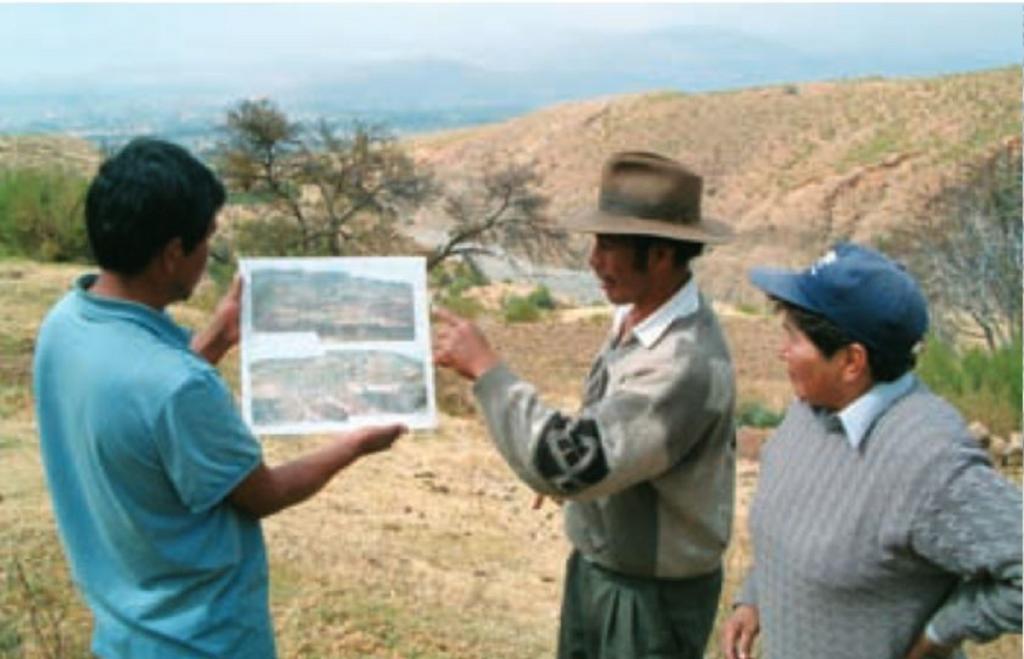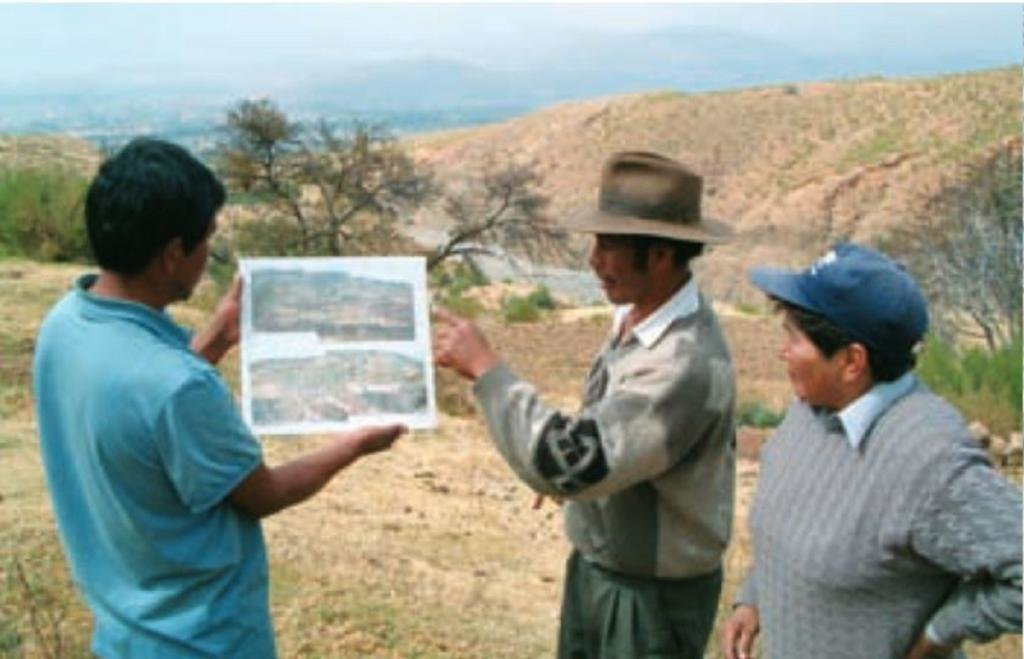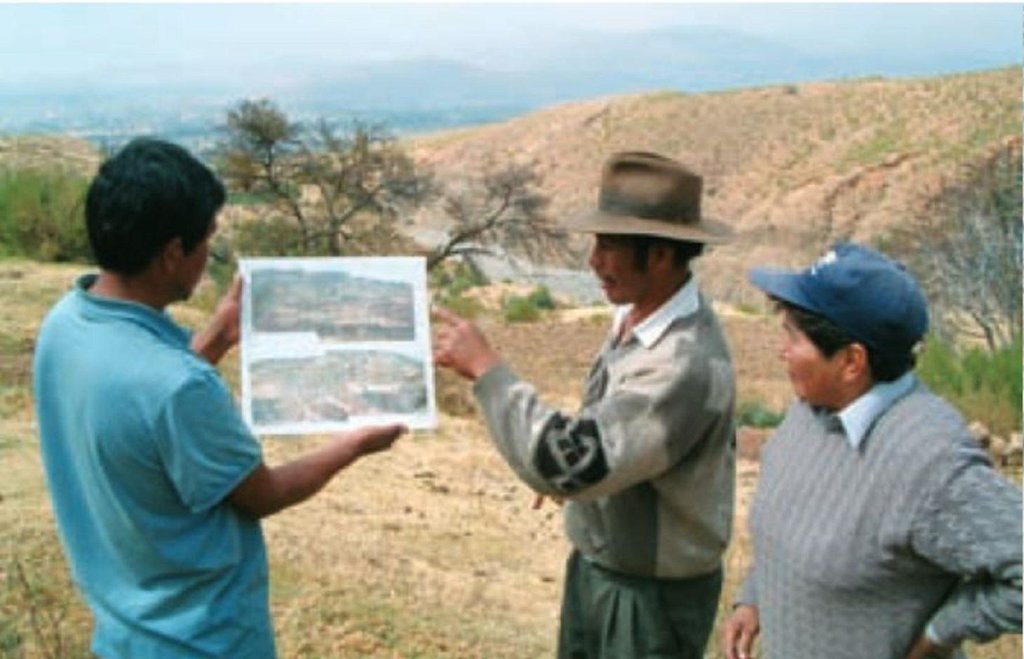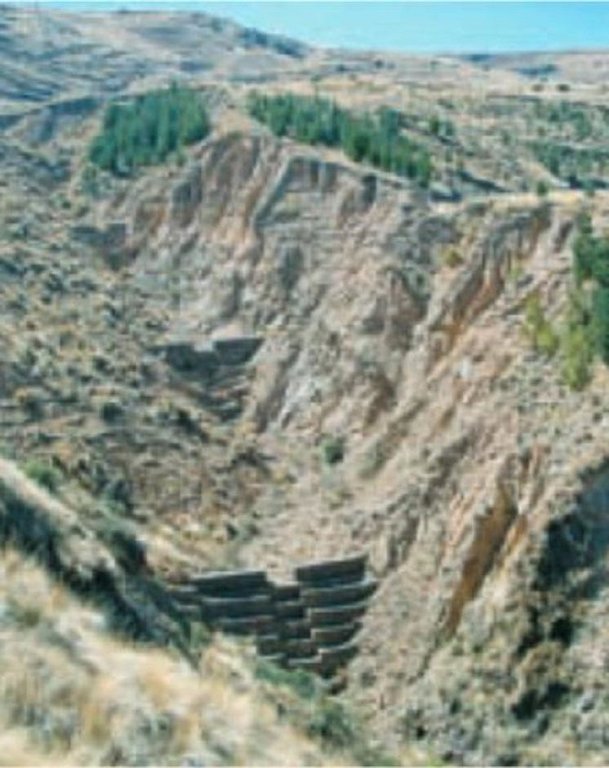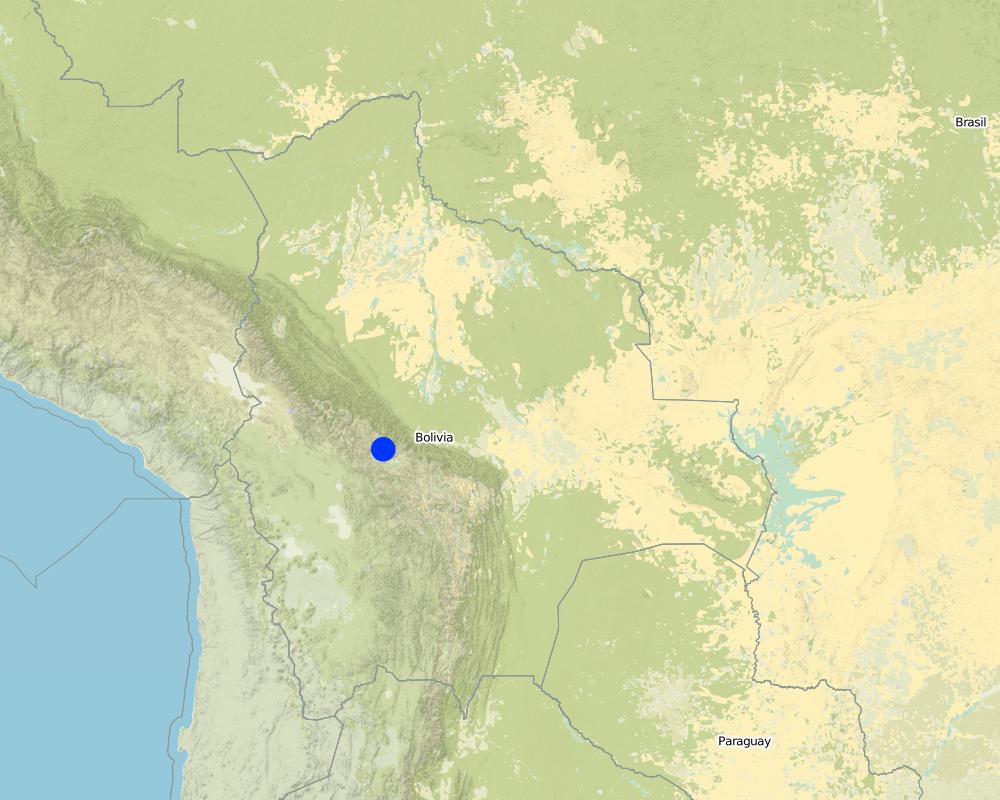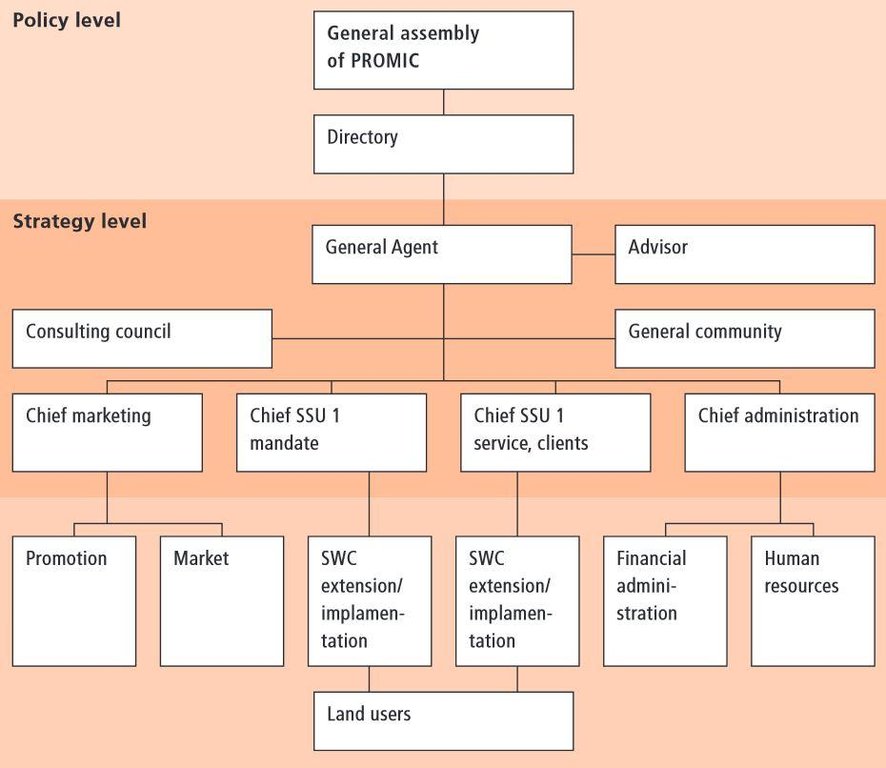Incentive-based catchment treatment [Боливи]
- Шинийг нээх:
- Шинэчлэх:
- Эмхэтгэгч: Unknown User
- Хянан тохиолдуулагч: –
- Хянагчид: David Streiff, Deborah Niggli
approaches_2404 - Боливи
Бүлгүүдийг үзэх
Бүгдийг дэлгэх Бүгдийг хаах1. Ерөнхий мэдээлэл
1.2 Арга барилыг баримтжуулах болон үнэлгээ хийхэд оролцсон хүн эсвэл байгууллагын холбоо барих хаяг
ГТМ мэргэжилтэн:
Арга барилыг баримтжуулах/үнэлэх ажилд дэмжлэг үзүүлсэн төслийн нэр (шаардлагатай бол)
Book project: where the land is greener - Case Studies and Analysis of Soil and Water Conservation Initiatives Worldwide (where the land is greener)Арга барилыг баримтжуулах/үнэлэх ажилд дэмжлэг үзүүлсэн байгууллага(ууд)-ын нэр (шаардлагатай бол)
GEOTEST AG (GEOTEST AG) - Швейцар1.3 WOCAT-аар баримтжуулсан өгөгдлийг ашиглахтай холбоотой нөхцөл
Эмхэтгэгч болон гол мэдээлэгч хүн(хүмүүс) WOCAT аргачлалаар баримтжуулсан мэдээллийг ашиглахтай холбоотой нөхцлийг хүлээн зөвшөөрсөн:
Тийм
1.4 ГТМ-ийн технологийн асуулгын(д) суурь мэдээлэл(д)

Diques de piedras [Боливи]
Se trata de diques de piedras que se ubican en el lecho de los arroyos, acompañados por plantaciones alrededor de las construcciones.
- Эмхэтгэгч: Unknown User

Zanjas de Coronación [Боливи]
Las zanjas de coronación impiden la entrada del escurrimiento superficial a las cárcavas
- Эмхэтгэгч: Unknown User
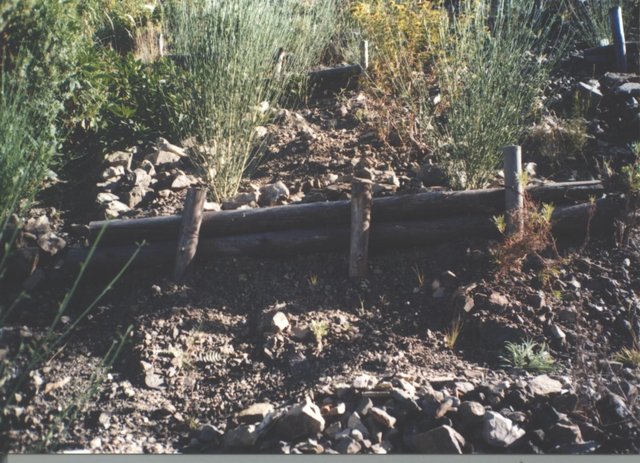
Estabilización de taludes (biotrampas) [Боливи]
La tecnología consiste en la práctica de reforestación en combinación con el establecimiento de trampas de sedimentos (biotrampas) para consolidar los taludes.
- Эмхэтгэгч: Georg Heim
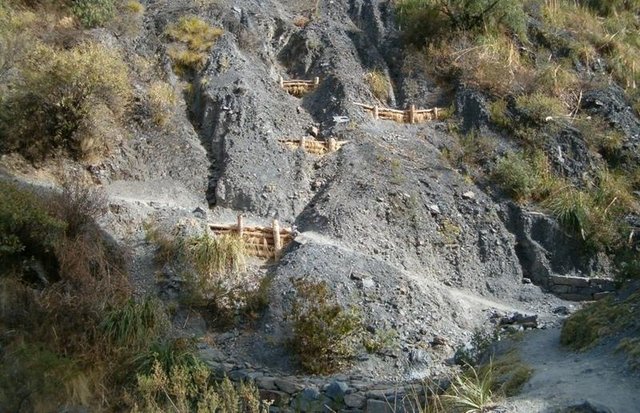
Gully control and catchment protection [Боливи]
Integrated gully treatment consisting of several simple practices including stone and wooden check dams, cut-off drains and reforestation in sediment traps (biotrampas).
- Эмхэтгэгч: Georg Heim
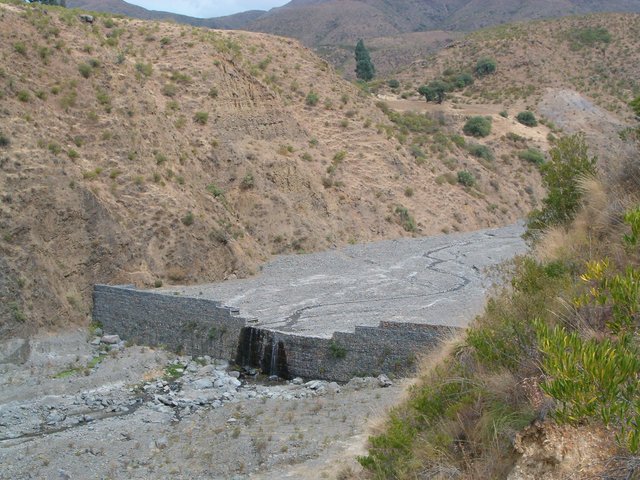
Obras Hidráulicas - Gaviones de Piedras [Боливи]
Mampostería gavionada (= gaviones puestos en el cauce). Se trata de paquetes de piedras encajadas en malla de alambre que forman una represa de sedimentos.
- Эмхэтгэгч: Georg Heim
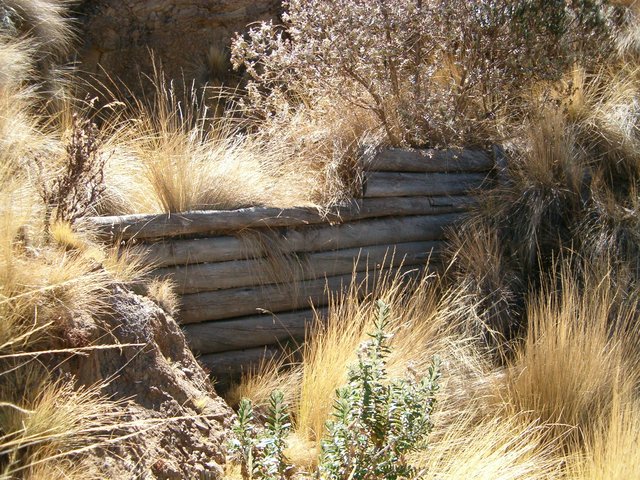
Diques de madera (tipo Krainer) [Боливи]
Se trata de diques de madera que se ubican en el lecho de los arroyos, acompañados por plantaciones alrededor de las construcciones.
- Эмхэтгэгч: Georg Heim
2. ГТМ Арга барилын тодорхойлолт
2.1 Арга барилын товч тодорхойлолт
A project supported, incentive-based approach: farmers are sensitised about erosion, and involved in gully control and other measures to protect catchments.
2.2 Арга барилын дэлгэрэнгүй тодорхойлолт
Арга барилын дэлгэрэнгүй тодорхойлолт:
Aims / objectives: The objective of the locally-based organisation Programa de Manejo Integral de Cuencas (PROMIC) is to involve land users in the control of soil erosion in the catchments above Cochabamba city. While erosion here is largely a natural process, it is aggravated by inappropriate agricultural practices. PROMIC receives funds from national and international governments, and works in an interactive manner. Together with local farmers, erosion processes in the context of the human environment were analysed to identify the needs of the agriculture population - and to plan a conservation and development programme. The aim was to convince farmers of the necessity to protect their agricultural land and stabilise the gullies below, and of the overall importance of implementing technologies to combat erosion.
Role of stakeholders: The farmers were involved in the process through regular community meetings organised by PROMIC, in which they could adjust PROMIC's catchment intervention plans to their own requirements through an interactive process. PROMIC considered that the sensitisation work and the interactive process were essential to ensure long-term sustainable land use. In the short term, however, it will be mainly the city downstream - Cochabamba - that benefits from the implementation of the erosion control technologies. For that reason, the farmers were paid to carry out construction of the measures (through 'cash-for-work'). The farmers should, however, profit from the technologies in the long term. They were taught how to build and maintain check dams, cut-off drains and biotrampas. The implementation in the watershed started in 1996 and took six years: when the implementation phase was over, farmers no longer received financial subsidies. The long period of sensitisation should help to ensure that farmers incorporate erosion prevention technologies into their cropland above the gullies. PROMIC still monitors the state of the structures from time to time, but most of the maintenance is left to the farmers themselves. PROMIC continues, however, to provide technical support and some transport of materials. Both internal and external evaluation followed the end of the implementation phase.
2.3 Арга барилын зурагууд
2.5 Арга барил нэвтрүүлсэн улс орон / бүс нутаг / байршил
Улс:
Боливи
Улс/аймаг/сум:
Cochabamba district
Map
×2.6 Арга барилыг эхлэх, дуусах огноо
Эхлэх жилийг тэмдэглэ:
1996
2.7 Арга барилын төрөл
- төсөл / хөтөлбөр дээр үндэслэсэн
2.8 Арга барилын үндсэн зорилго, зорилтууд
- teach farmers about sustainable land use, - build up skills amongst farmers to enable them to treat gullies without outside help, - reduce flooding and sedimentation in the valley of Cochabamba and general soil loss in the area through collaboration with farmers in the watershed, - improve traditional agriculture with a package of conservation-related practices, - indirectly support farmers by cash-for-work incentives which enables them to implement SWC technologies on their own fields
The SLM Approach addressed the following problems: - lack of knowledge about damage caused by erosion and benefits of various possible conservation technologies, - lack of financial resources: shortage of funds prevents farmers investing in technologies, even if these bring benefits to them (as well as to the downstream population), - persistence of detrimental traditional agricultural practices, leading to accelerated degradation
2.9 Арга барилын хүрээнд хэрэгжсэн Технологи/Технологиудад дэмжсэн эсвэл саад учруулсан нөхцлүүд
санхүүгийн нөөц, үйлчилгээний хүртээмж / боломж
- Хазаарлалт
Few direct short-term profits from SWC technologies in gullies for the farmers in the watershed (the main beneficiary is the city of Cochabamba downstream).
Treatment through the SLM Approach: Search for national and international subsidies to help the farmers to implement the technologies during the initial period.
Бүтэц зохион байгуулалт
- Хазаарлалт
The local farmers' association is insufficiently organised to ensure the independent continuation of activities post-project.
Treatment through the SLM Approach: Local farmers' association should be included in the sensitisation and implementation process.
Бусад
- Хазаарлалт
Climate: Climatic extremes such as strong winds and excess or deficit of rain.
Treatment through the SLM Approach: Plant trees at close spacing, and plant trees/ shrubs that can tolerate climatic extremes.
3. Оролцогч талуудын оролцоо ба үүргүүд
3.1 Арга барилд оролцогч талууд болон тэдгээрийн үүргүүд
- Орон нутгийн газар ашиглагч / орон нутгийн иргэд
There were no women working in the gully rehabilitation. The reason is a cultural taboo against women working with heavy materials; women are responsible for looking after cattle, and for the household.
- олон нийтэд түшиглэсэн байгууллагууд
Local farmers association
- Specialised engineers of PROMIC
3.2 Арга барилын янз бүрийн үе шатанд орон нутгийн газар ашиглагчид / бүлэглэлүүдийг татан оролцуулах
| Орон нутгийн газар ашиглагч / орон нутгийн иргэдийн оролцоо | Хэн оролцсоныг тодорхойлж, үйл ажиллагааг тайлбарлана уу | |
|---|---|---|
| санаачлага/идэвхжүүлэлт | идэвхигүй | interviews/questionnaires, information during regular meetings, entrevistas / cuestionarios |
| Төлөвлөгөө | интерактив | results of the socio-economic diagnosis defined the planning; farmers were involved through regular meetings: interactive planning at individual and community level |
| Хэрэгжилт | Гадаад дэмжлэг | None |
| Мониторинг/ үнэлгээ | идэвхигүй | interviews/questionnaires; internal and external evaluations where farmers were interviewed |
| Research | идэвхигүй | socio-economic diagnosis; collection and analysis of bio-physical baseline data |
3.3 Диаграм (хэрэв боломжтой бол)
Тодорхойлолт:
General assembly: National and international public and private institutions, members, foundation
Directory: Prefecture, general agent, Swiss Agency for Development and Cooperation (SDC), Belgian Technical Cooperation (BTC), private enterpreneurs
Consulting council: Municipalities, projects, universities
Advisors: General agent, marketing, SSU1, SSU2 (see below), administration
SSU: Strategic service unit
Services: Executive body for technology extension and implementation: PROMIC field technicians
3.4 ГТМ-ийн технологи/технологиуд сонгох шийдвэр
Технологи(д) сонгох шийдвэр гаргасан уу?
- Made by specialised engineers of PROMIC
Тайлбар:
farmers were involved by modifying initially proposed technologies.
Decisions on the method of implementing the SLM Technology were made by Made by specialised engineers of PROMIC
4. Техникийн дэмжлэг, чадавхи бүрдүүлэх, мэдлэгийн менежмент
4.1 Чадавхи бэхжүүлэх/сургалт
Газар эзэмшигчид / бусад оролцогч талуудад сургалт явуулсан уу?
Тийм
Сургалтын хэлбэр:
- Ажил дээр
Хамрагдсан сэвдүүд:
The approach included training on technical aspects and on long-term planning for sustainable land use. Some farmers were trained to become foremen - who in turn instructed other farmers. During the construction period PROMIC project staff trained farmers on the job in soil conservation practices.
4.2 Зөвлөх үйлчилгээ
Газар ашиглагчдад зөвлөх үйлчилгээ авах боломжтой байдаг уу?
Тийм
Зөвлөх үйлчилгээ үзүүлсэн эсэхийг тогтоо:
- Газар ашиглагчийн талбай дээр
Тодорхойлолт / тайлбар:
Name of method used for advisory service: participatory planning of gully treatment; Key elements: making farmers aware of the environmental and economic necessity for the technology, interactive planning of technology implementation at individual and community levels
4.3 Институцийг бэхжүүлэх (байгууллагын хөгжил)
Арга барилаар дамжуулан институц байгуулагдаж эсвэл бэхжсэн үү?
- Тийм, дунд зэрэг
Байгууллагууд бэхжиж, үүсэн бий болсон түвшин(үүд)-г тодорхойлно уу:
- Орон нутгийн
Дэмжлэгийн төрлийг ялга:
- чадавхи бэхжүүлэх / сургалт
4.4 Мониторинг ба үнэлгээ
Мониторинг болон үнэлгээ нь арга барилын хэсэг үү?
Тийм
Тайлбар:
There were few changes in the Approach as a result of monitoring and evaluation: The approach was to initially target groups. Later, individuals were included (with individual farmer-family visits) to improve the effectiveness of the awareness raising and the implementation.
4.5 Судалгаа
Судалгаа арга барилын хэсэг нь байсан уу?
Тийм
Сэдвийг тодруулна уу:
- Социологи
- Экологи
- Технологи
- S
Дэлгэрэнгүй мэдээллийг өгч, хэн судалгаа явуулсныг бичнэ үү:
Research was done on 1)SWC (testing different measures), 2)various soil parameters, and 3) a socio-economic survey. Research was an important part, not only for planning (based on biophysical and socio-economic data), but also to stay in contact with the rural population and to obtain their confidence. Thanks to the research, the technology is well adapted to the biophysical conditions.
5. Санхүүгийн болон гадаад материаллаг дэмжлэг
5.1 ГТМ-ийн Арга барилын бүрэлдэхүүн хэсгийн жилийн төсөв
Тайлбар (жнь: санхүүжилтийн гол эх үүсвэр / гол хандивлагчид):
Approach costs were met by the following donors: government (national): 20.0%; international non-government: 80.0%
5.2 Газар ашиглагчдад санхүүгийн / материаллаг дэмжлэг үзүүлсэн
Технологи / технологийг хэрэгжүүлэхэд газар ашиглагчид санхүүгийн / материаллаг дэмжлэг авсан уу?
Тийм
5.3 Тодорхой зардлыг даахад чиглэсэн дэмжлэгт (хөдөлмөрийн хүчийг оролцуулаад)
- Ажил хөдөлмөр
| Ямар талбайн хэмжээнд | Тэтгэмж, урамшууллыг тодорхойлно уу |
|---|---|
| Бүрэн санхүүждэг | labour for the rehabilitation of the gully area |
- Тоног төхөөрөмж
| Ямар хөрөнгө оруулалт татаасаар олгогдсоныг заана уу | Ямар талбайн хэмжээнд | Тэтгэмж, урамшууллыг тодорхойлно уу |
|---|---|---|
| машин төхөөрөмж | Бүрэн санхүүждэг | |
| Багажууд | Бүрэн санхүүждэг | |
- Хөдөө аж ахуй
| Ямар хөрөнгө оруулалт татаасаар олгогдсоныг заана уу | Ямар талбайн хэмжээнд | Тэтгэмж, урамшууллыг тодорхойлно уу |
|---|---|---|
| seedlings | Бүрэн санхүүждэг | |
- Дэд бүтэц
| Ямар хөрөнгө оруулалт татаасаар олгогдсоныг заана уу | Ямар талбайн хэмжээнд | Тэтгэмж, урамшууллыг тодорхойлно уу |
|---|---|---|
| Зам | Бүрэн санхүүждэг | community infrastructure |
| technical support | Бүрэн санхүүждэг | |
- бусад
| Бусад (тодорхойлно уу) | Ямар талбайн хэмжээнд | Тэтгэмж, урамшууллыг тодорхойлно уу |
|---|---|---|
| transport for further technology implementation | Бүрэн санхүүждэг |
Хэрэв газар ашиглагчийн хөдөлмөрийн хүч чухал байсан бол энэ нь аль хэлбэр байсан:
- бэлэн мөнгөөр төлдөг
Тайлбар:
100% of the implementation was subsidised. Farmers were contracted to build the structures
5.4 Кредит
Арга барилын хүрээнд ГТМ-ийн үйл ажиллагаанд зориулж зээлд хамрагдсан уу?
Үгүй
6. Нөлөөллийн дүн шинжилгээ ба дүгнэлт
6.1 Арга барилын нөлөөллүүд
Арга барил нь ГТМ-ийн технологийг хэрэгжүүлж, хадгалахад газар ашиглагчдад тусласан уу?
- Үгүй
- Тийм, бага зэрэг
- Тийм, зарим
- Тийм, их
The approach resulted in a considerable improvement in SWC. However, despite new knowledge about erosion, the farmers themselves hardly carry out any new gully conservation work without payment, and in the long term maintenance is not ensured.
Did other land users / projects adopt the Approach?
- Үгүй
- Тийм, бага зэрэг
- Тийм, зарим
- Тийм, их
Some other projects in Bolivia have copied parts of PROMIC's approach.
6.3 Арга барилын үйл ажиллагааны тогтвортой байдал
Газар ашиглагчид арга барилаар дамжуулан хэрэгжүүлсэн арга хэмжээг тогтвортой хадгалж чадах уу (гадны дэмжлэггүйгээр)?
- Тодорхойгүй
6.4 Арга барилын тогтвортой/давуу тал/боломжууд
| Эмхэтгэгч, бусад мэдээлэл өгсөн хүмүүсийн өнцгөөс тодорхойлсон давуу тал/боломжууд |
|---|
| Good technical support during and after conclusion of the implementation phase (How to sustain/ enhance this strength: Technical support not enough on its own - needs to be complemented by further sensitisation.) |
| Sensitisation of the farmers to erosion and degradation processes, and awareness creation about the impact and necessity of SWC in the hills to protect the valleys (How to sustain/ enhance this strength: Continued sensitisation work after the implementation phase.) |
| Transparent process during research, planning and implementation phases; incorporation of farmers' ideas (thus: good acceptance of PROMIC by the rural population). |
| Integration of farmers in the process of implementation of soil conservation. (How to sustain/ enhance this strength: Farmers need to be even more integrated in the process of monitoring to guarantee the maintenance of the soil conservation achieved.) |
6.5 Арга барилын дутагдалтай/сул тал/аюул болон тэдгээрийн хэрхэн даван туулах арга замууд
| Эмхэтгэгч, бусад мэдээлэл өгсөн хүмүүсийн өнцгөөс тодорхойлсон сул тал/ дутагдал/ эрсдэл | Тэдгээрийг хэрхэн даван туулах вэ? |
|---|---|
| Farmers implementing SWC are not those benefiting most from the impact in the short term; even though the city of Cochabamba benefits considerably, financial support for implementation has stopped | Seek financial support from Cochabamba; implement a system of payment for environmental services |
| Lack of money for replication and long-term maintenance of SWC measures | Guarantee financial support in the threatened area, by the local government and international organisations. |
| Sensitisation phase (for farmers and government) was too short to ensure sustained application of the technology without external support and supply. Established structures are often neglected and thus deteriorate | Find new donors to continue the training/awareness raising on SWC technologies. Include the farmers in the monitoring visits and demonstrate examples of successful SWC (positive stimuli). |
7. Суурь мэдээлэл болон холбоосууд
7.1 Мэдээллийн эх үүсвэр/аргууд
- Хээрийн уулзалт, судалгаа
- Газар ашиглагчтай хийсэн ярилцлага
7.2 Холбогдох бүтээлийн ишлэл
Гарчиг, зохиогч, он, ISBN:
PROMIC documentation
Хаанаас авч болох вэ? Зардал?
Mooseggstrasse 9, 3550 Langnau, Switzerland; geoheim@bluewin.ch
Холбоос ба модулууд
Бүгдийг дэлгэх Бүгдийг хаахХолбоосууд

Diques de piedras [Боливи]
Se trata de diques de piedras que se ubican en el lecho de los arroyos, acompañados por plantaciones alrededor de las construcciones.
- Эмхэтгэгч: Unknown User

Zanjas de Coronación [Боливи]
Las zanjas de coronación impiden la entrada del escurrimiento superficial a las cárcavas
- Эмхэтгэгч: Unknown User

Estabilización de taludes (biotrampas) [Боливи]
La tecnología consiste en la práctica de reforestación en combinación con el establecimiento de trampas de sedimentos (biotrampas) para consolidar los taludes.
- Эмхэтгэгч: Georg Heim

Gully control and catchment protection [Боливи]
Integrated gully treatment consisting of several simple practices including stone and wooden check dams, cut-off drains and reforestation in sediment traps (biotrampas).
- Эмхэтгэгч: Georg Heim

Obras Hidráulicas - Gaviones de Piedras [Боливи]
Mampostería gavionada (= gaviones puestos en el cauce). Se trata de paquetes de piedras encajadas en malla de alambre que forman una represa de sedimentos.
- Эмхэтгэгч: Georg Heim

Diques de madera (tipo Krainer) [Боливи]
Se trata de diques de madera que se ubican en el lecho de los arroyos, acompañados por plantaciones alrededor de las construcciones.
- Эмхэтгэгч: Georg Heim
Модулууд
Модуль байхгүй байна


